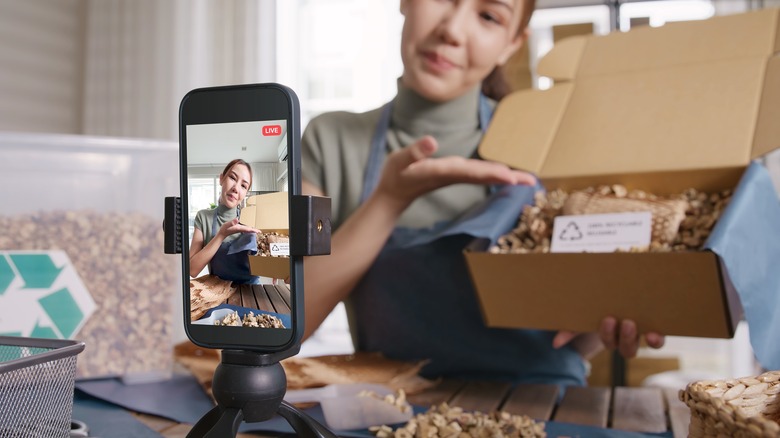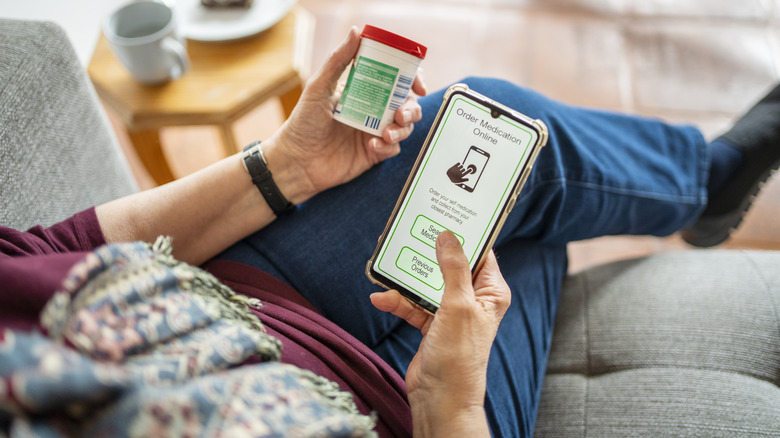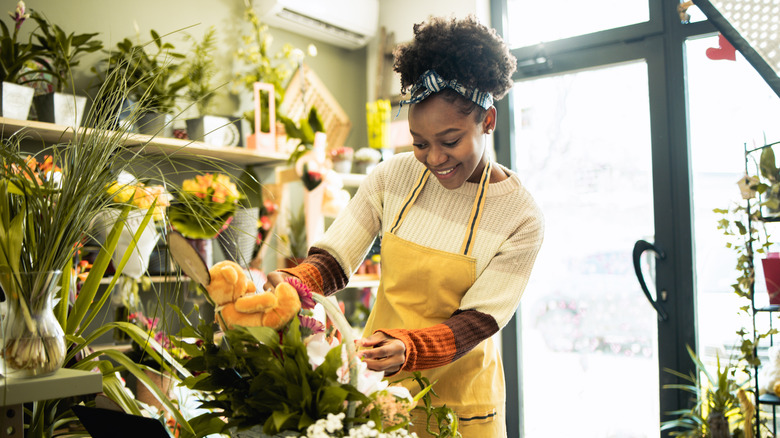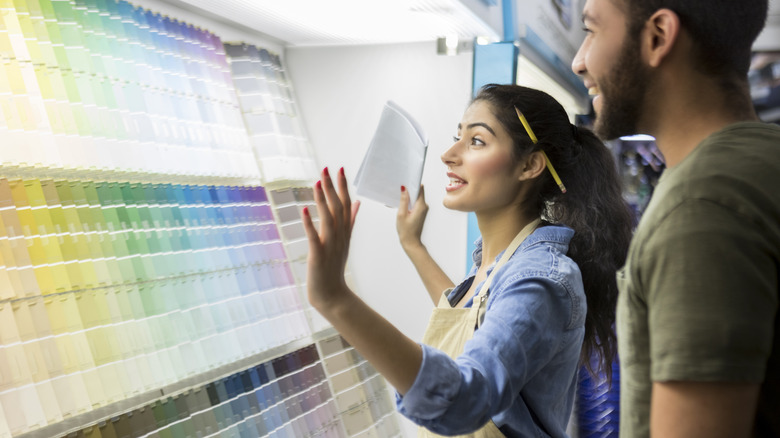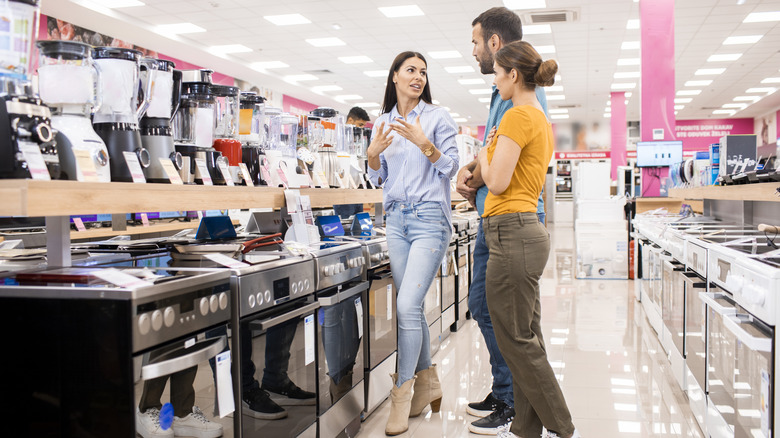13 Products You Should Always Buy In-Store Instead Of Online
With 268 million Americans — roughly 70% of the population — shopping online in 2022, it's fair to say that e-commerce is thriving. A rising estimate of 285 million online shoppers by 2025 makes that point. That said, there's still a lot of shopping done inside brick-and-mortar retail establishments. A Capital One study found that 72% of customers still shop in stores every week, with an equivalent percentage of sales projected to occur in brick-and-mortar stores in 2024. Almost half — 45% — still prefer to shop at walk-in establishments as opposed to online.
There are several reasons for this. While online shopping has perks like avoiding the packed crush of a mall crowd, online-based promotions and deals, and the ease of browsing for price comparisons, it remains that in-person shopping offers no scheduling conflicts around delivery windows and the confidence associated with being able to see, feel or even test a product up close. There are always mitigating factors in any shopping experience but it's widely accepted by financial experts that there are some things better to buy in-store than online. Here are a few.
Groceries
With the proliferation of grocery delivery, the question needs to be asked whether there are more benefits to shopping online or in-store. At least one of the sneaky ways grocery stores trick you into spending money revolves around online orders. Between curbside pick-up and home delivery, apps will usually give you an option that will affect the total you will pay. There can be a lack of transparency around how much you pay in additional fees for delivery, curbside service, or otherwise when you order something online.
6ABC WPVI-TV reported the experience of Philly local, Jessie Klink, who realized she paid $9 more for her groceries after picking up her online order at the store and inspecting her bill. Reporters did their own research and found that, while stores like Walmart, Whole Foods, Giant, and Acme don't charge more for their online purchases, other stores do. For example, a gallon of milk purchased online was 46 cents more than in-store, according to the station's reporting, while a 10-ounce bag of chips was 40 cents more. It may seem like small change, but a large grocery store purchase with a 43-cent difference on 20 items or more can add up quickly. Even when prices aren't significantly different, the one thing you can't do is ensure you're getting the freshest produce, meat, or dairy products in the store, virtually.
Shoes
Between 2024 and 2028, the shoe market is expected to climb by 3.25% year over year according to Statista. If that doesn't sound significant, consider that 2024 sales of footwear in the U.S. are forecasted to reach around $91 billion in revenue — the equivalent of $270 per person — making the U.S. footwear market the largest in the world. Online sales of shoes account for 29.7% of the footwear sold in the U.S. and should grow to around 37% by 2017. While it's apparent that Americans buy a lot of shoes, it doesn't necessarily mean it should be done online.
Think twice about making online purchases of shoes, especially if you've never ordered or worn shoes from the company and there's a no-return policy in effect. Practically speaking, different footwear manufacturers, specifically where style-forward shoes like heels are concerned, will have their own measurements for sizing for everything from insoles to heel height. These are factors that go beyond wasted money for poorly sized orders, but also, the health impact on your feet. Ingrown toenails, bunions, tendonitis, and hammertoes can be the result of badly fitting shoes. If you must order online, play it safe and stick to comfy sneaker brands you know.
Prescription meds
Ordering from online pharmacies can be cheaper than going through your insurer by accessing discount programs or cards, like the pharmacy discount cards offered by Amazon or GoodRX. One out of five prescriptions filled online was less costly than through an insurer, saving $1.83 billion and $969 million for GoodRX and Amazon Pharmacy members over a year. While saving money on prescriptions is always great, you may not want to go that route, or at the least be very careful about how you go around doing that.
The U.S. Food and Drug Administration (FDA) advises that several online pharmacies aren't legitimate, usually selling federally uncleared, ineffective, or just downright dangerous meds to anyone without a prescription, at a discount. Since these fly-by-night online stores are unregulated, the medication you are purchasing could be from other countries with lower standards of medical clearance for prescription medication and could lead to you purchasing expired, counterfeit, and potentially harmful medications for you or your family member. If your online store isn't located in the U.S., doesn't ask for a doctor's prescription, and isn't a licensed pharmacy with actual pharmacists for you to speak to, don't give them your financial information or order anything from them. Better off going to see the pharmacist in person.
Televisions
Although the size of your screen can oscillate between a smartphone, tablet, or laptop, most people still opt for a television for streaming entertainment. Estimated to grow profit at a rate of $18.4 billion by the end of 2024, a projected sales growth of 77% between 2024 and 2028 indicates that televisions aren't going anywhere soon. If you're in the market for a new TV, here's why you may want to make that purchase in-store instead of online.
One of the most present dangers associated with ordering online is the potential for damage occurring to your television during delivery. While a warranty may protect you from that possibility, the hassle of returning the television to the store — defeating the purpose of ordering online in the first place — is something you can mitigate by taking the TV home yourself. While online purchases may offer a greater selection of products in one easy-to-browse place, it doesn't allow you the confidence of seeing the product up close, try it out in the store, and avoid delivery charges that can eat away at any discount an online order may have given you. Finally, if you pick the TV up in-store, you can go home with it immediately instead of waiting a week or more for your order to arrive at a date and time potentially not of your choosing.
Beauty products
Beauty products in the U.S. are expected to hit a high of $23.12 billion by 2028 after growing its market an additional $3.7 billion over the next three years. While it may take a little research to figure out which beauty store is better for your wallet, you can more easily decide whether an online or in-store purchase makes more sense. Much like with footwear, you want to avoid ordering any product online that you're not familiar with for the simple reason that you don't know if it works for your needs, and it's doubtful you can return the product after opening it.
From a health and wellness perspective, skincare products can have various negative reactions to different skin types. Without the benefit of a professional consultation, you leave yourself open to such adverse effects as redness, irritation, and in the most extreme cases, chemical burns and bad allergic reactions. While third-party online stores allow for ease of shopping and may even provide you with an assessment based on a set of predetermined questions, trusting an algorithm programmed to sell you a product to honestly gauge your susceptibility to a negative reaction — based on a templated list of questions — is probably a bad idea.
Vehicles
Whether buying a used car or buying a brand new car, there are a few companies offering consumers the ability to view and purchase vehicles online. While a viable approach, people in the market for used cars should consider the following. Practically speaking, you can't inspect a vehicle that's not in front of you, can't negotiate since both the seller and the car are elsewhere, and since you can't speak to a salesperson at a dealership, you can't access professional, trustworthy advice about a better vehicle for your needs or even just warranty protection that could and should be included with your vehicle purchase.
Where new cars are concerned, the same worries around testing and the trustworthiness of your seller come into play. However, another problem is that you could find your choice of financing is limited to the dictates of the online vendor acting as the intermediary between you and the seller. That can affect how much financing you can access and how much that credit will end up costing you in the end.
Bicycles
While the sale of bicycles dropped off in 2022 and is believed to remain fairly lateral, sales in the U.S. are still projected to hit around 18 million bikes or the equivalent of $9.4 billion by 2027. If you're purchasing a bike and invested in getting one that works well for your height, weight, and build, want expert advice from a knowledgeable bike technician who can help you make a perfect selection for your needs, and want to take advantage of the ability to negotiate upgrades or replacement parts for your bike at discounted rates, then an in-store experience is your best option.
Cameron Nicholls, a cyclist from the UK, detailed some of the challenges of buying the cycling equipment online courtesy of Bike Chaser. As an admittedly regular user of online shopping for bike parts, he soon soured on the experience. In a quote, Nicholls explained, "Not only would I fill my cart with irrelevant stuff, the accessories or cycling gear I often purchased wouldn't fit me properly or looked ugly mounted onto my bike. I can't tell you how many old bike lights I have in the shed." Nicholls realized after a visit to a local bike shop that, although some items could cost a little more, the quality of the equipment and conversations with knowledgeable bike mechanics in the shop, made the regular trips worthwhile.
Flowers
According to the U.S. Department of Agriculture (USDA), 22% of the population bought flowers for Valentine's Day 2022 to the tune of $2.3 billion in sales. However, the way people get those flowers can show disdain toward the environment and our pocketbooks. If you search for flowers in your area, you'll very likely end up sifting through a minefield of third-party providers who aren't florists, but rather, middlemen who make their money by passing your order on to a legitimate florist — imagine a sort of Uber Eats, but for flower delivery — which has the double-negative impact of taking money away from a small business in your neighborhood, and tacking on additional fees you otherwise wouldn't pay if you just visited the local florist yourself.
As it relates to the carbon footprint of ordering flowers online, if your flowers aren't grown locally or aren't a seasonal arrangement, they could be traveling from ridiculous distances with fuel and driver costs that will not only be applied to your bill but will add unnecessary carbon emissions to the environment. Aside from any of that, a florist can advise you on what flowers are best for the occasion and arrange them in a way that is more cost-effective, sustainable, and eye-catching.
Furniture
Nearly everyone has ordered furniture for their home or office, often with mixed results. A 2022 survey conducted by ChaseDesign found that 85% of Americans planned on doing more in-store shopping in 2022 based on the desire to examine new products up close while being able to take advantage of professional knowledge or sales staff. Along with a return to brick-and-mortar shopping, 93% of shoppers want an online experience that mimics the experience of in-store shopping.
Many online sales platforms are rife with fraudulent positive reviews of products and services courtesy of cash-incentivized mock reviews, which the World Economic Forum estimates cost consumers $152 billion worth of disappointment in 2021. While three-dimensional virtual viewing can help alleviate some concerns, up to 10% of furniture purchases are still returned by unhappy customers. The process for returning that furniture can be arduous, with return fees and scheduled return windows turning your initial perception of convenience into a complicated and expensive nightmare. Keep in mind the six furniture retailers in the U.S. with the largest market share raked in $37 billion in furniture sales in 2021. However, the reviews of these companies dropped from 79% satisfaction in 2011, to 9% satisfaction by 2022. Where furniture is concerned, choose quality over convenience.
Musical instruments
With the market for musical instruments in the U.S. projected to reach just over $25 billion by 2030, it's reasonable to assume that some of those sales will take place online. The maintenance required to keep an instrument in good working condition can come into play when purchasing an instrument online, particularly if it's a second-hand purchase. Some instruments have been languishing in seller's closets for years, which means the discount you may get on purchasing the instrument could evaporate with the cost of bringing the instrument back into prime condition. On the flip side, if the instrument is relatively new and being sold privately by the owner online, it's reasonable to ask yourself why. Likely, there's something off about the instrument. As with most specialty items in today's market, the danger of purchasing lower-grade knockoff products is also real.
If you don't know what you're buying and don't have the guidance of a reputable store owner you may not end up buying what you thought. Shopping locally in-store will also provide the benefits of negotiable payment options you wouldn't otherwise get online, as well as service and warranty guarantees you aren't going to get from a strange third-party or private seller.
Paint
Paint is another big seller that now has an online sales presence. In 2023, the paint market was a $33 billion beast, up just over $2 billion from the previous year. Architectural Digest detailed a J.D. Power Paint Satisfaction Survey showing that Gen Z and Y are more likely to purchase paint online and tend to experience more satisfaction shopping for paint online versus in person. In fact, according to Natalie Ebel, co-founder of online paint company Backdrop, half of their customers are willing to purchase paint without paint samples.
According to Housedigest, before you buy paint online you should recognize that the color you see online will likely appear quite different on your walls, and since the majority of paint sellers aren't keen to take back opened cans of paint, a strict no refund or return policy could leave you with several cans of paint colors you don't want to use. If the online store has a physical location, the logical move would be to arrange to visit the store and see the paint samples up close before making a purchase. That said, if you're going to go to the store anyway, you might as well buy the paint you want at the same time.
Major appliances
Buying major appliances like a refrigerator or stove sight unseen is asking for trouble. You don't want to spend thousands of dollars without actually viewing and testing the product on the showroom floor. Having salespeople who understand the product and can answer questions is invaluable. The other benefit to speaking directly to a salesperson is the ability to wheel and deal. According to the survey, customers who negotiated with their salesperson managed to discount as much as $100 off their purchase. When you consider that taxes are typically included in your online order, that's a win right there. Also, once you purchase that fridge online, it will be up to you to get rid of the old one, whereas in-store purchases often come with a haul-away offer that may even come with a rebate.
Delivery comes with its own set of risks since delivery drivers will have as much knowledge as you about the working condition of your appliance. Since you've never seen the product up close, you can't know if the damage happened before or after the driver picked it up. Without proof of blame, you're pretty much stuck with a very expensive but faulty appliance that you either have to pay to repair or, if under warranty, send back to the manufacturer — assuming you can — for repairs.
Pets
When it comes to things you should never buy online, pets rank pretty high. With just over 86 million households in the U.S. owning a pet in 2024, it's obvious that this is a huge market to address. Animal advocates and rescue staff point to some online sales portals as puppy mills that breed dogs for profit with little concern for the health or wellness of the animals. Your online purchase could be inadvertently supporting a business modeled on the abuse of animals. If that's not bad enough, incidents of fraud are easier to pull off online through a form of catfishing that involves photos of animals that don't actually exist — or belong to someone else.
According to the Humane Society Of The United States, there are thousands of cats and dogs brought in from overseas that arrive ill or die due to suffering horrible conditions before their arrival. In a quote from the senior director of the U.S. branch of the Humane Society, John Goodwin, on the organization's website, "Even if you get the puppy you ordered, it may have come from a puppy mill and they won't show you the deplorable conditions they're kept in. If you are buying a puppy from a breeder, make sure you meet the breeder, meet the mother dog, and see where she lives." The only way to do any of that is in person.
